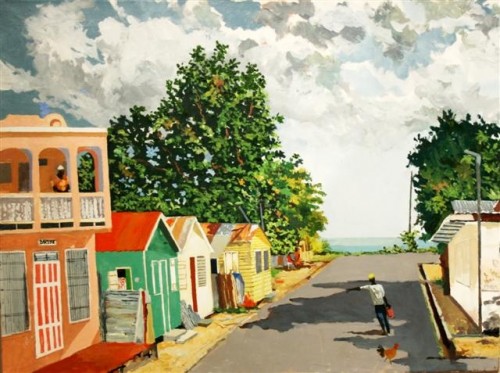

Image courtesy of June Kelly

Class members:
Mark Brannan, English major '14
Aminata Dumbuya, English major '14
Carolyn Griffith, English major '14
Grayson Hill, English major '15
Catherine O'Donnell, English major '15
Coleman O'Neill, English major '14
Taylor Pisel, English major '14
Javier Robles, Political Science '15
Wednesday 1:30 -4:20p.m., Chambers 1096
Professor Brenda Flanagan, 203 Preyer. Telephone: 704-894-2434
Email: brflanagan@davidson.edu
Course Description
Wole Soyinka and Derek Walcott, both Nobel Laureates, have placed the literature of West Africa and of the Caribbean, respectively, on the world stage. Soyinka, born in Nigeria, and Walcott, born in Saint Lucia, appear, through their writing, to have complex relationships with the regions in which they were born, and it is the nature of those relationships that this seminar seeks to understand. But why, one may ask, should anyone care about Soyinka or Walcott’s relationship or vision of Africa or the Caribbean? The answers to that question are connected, first, to the fact that as Nobel Laureates, the world’s most prestigious literary body has authorized their works. Their words and their sensibilities matter. Second, both writers have made the politics of their regions central to their work, and in doing so, have created spaces within which readers may forage for an understanding of postcolonial Nigeria, especially, and West Africa in general, and Saint Lucia, Trinidad—Walcott’s adoptive home--and even to the wider Caribbean, post independence. The seminar will therefore seek answers to where Soyinka and Walcott exist, aesthetically and politically, in relation to these spaces, and how their plays, essays, and in Walcott’s case, short fiction, illustrate these dynamics. Because Walcott and Soyinka are also important poets, students are free to study their poetry as those relate to each writer’s poetics.
Questions to Consider
1. In evaluating a writer’s poetics of aesthetics, what standards or criteria are we to use?
2. Beyond an examination of the writer’s words, are we to focus on his/her actions? Why?
3. What do we have to know, first, before we set evaluation standards?
4. Whose words, other than the writer’s, should we trust/accept as believable, plausible or repeatable?
5. Is legitimacy—define this first—crucial to our evaluation of a writer’s poetic?
6. As Colonization in Africa and the Caribbean is an unavoidable motif in Soyinka and Walcott’s writing, how are we to define it?
7. What role does language play in our assessment of a writer’s poetics?
|
|

Image courtesy of Menard Gallery
Davidson College Library Research Guides are licensed under
CC BY-SA 4.0.
Mailing Address: Davidson College - E.H. Little Library, 209 Ridge Road, Box 5000, Davidson, NC 28035